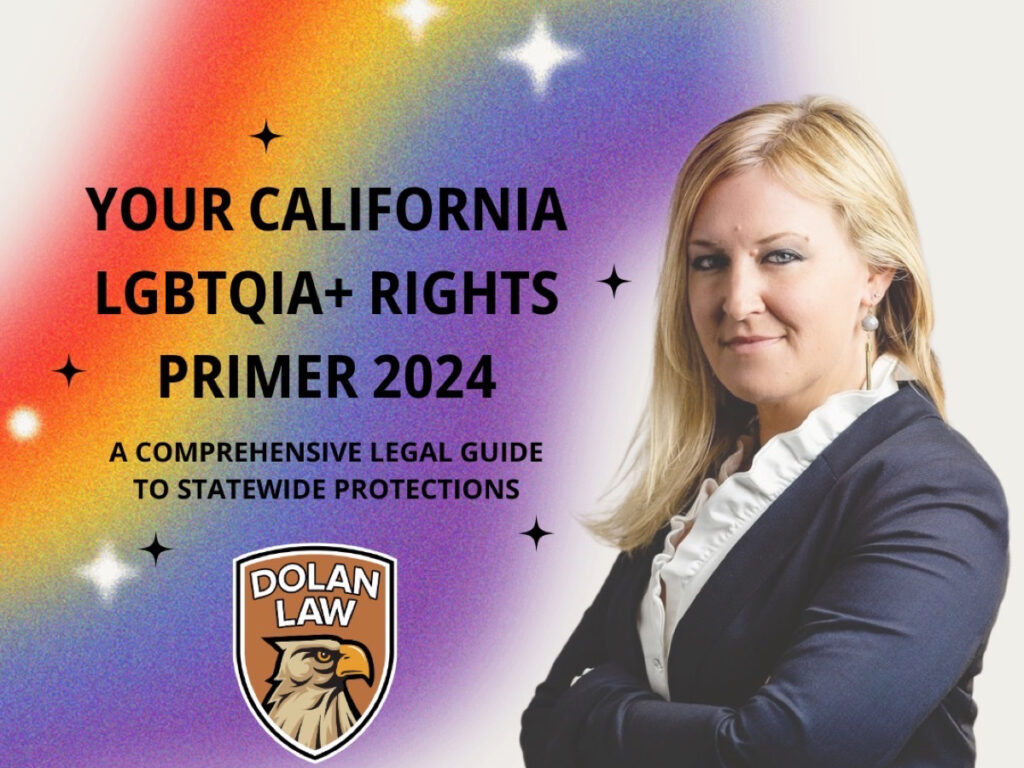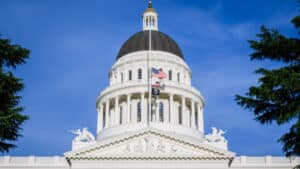Written by: Vanessa C. Deniston, Executive Director, Dolan Law Firm DE&I Committee
California is home to the nation’s largest self-identifying population of lesbian, gay, bisexual and transgender population and continues to be a leading change agent for the advancement of LGBTQIA+ rights across the nation. The following reference guide summarizes the key legal protections for LGBTQIA+ Californians as of June 2024 pertaining to marriage, parenthood, employment, education, healthcare, housing, and the criminal justice system.
THE LGBTQIA+ ACRONYM AND CALIFORNIA’S LEGAL FRAMEWORK
California has some of the most comprehensive legal protections for LGBTQIA+ individuals in the United States. While the acronym LGBTQIA+ is widely recognized, it’s important to understand how California law specifically defines and protects this diverse community.
LGBTQIA+ stands for Lesbian, Gay, Bisexual, Transgender, Queer and/or Questioning, Intersex, Asexual, and more. The “+” acknowledges that this acronym continues to evolve as our understanding of gender and sexuality expands. It’s worth noting that definitions and terminology in this space are fluid and can mean different things to different people.
Given the ongoing evolution of the LGBTQIA+ acronym, California law typically frames its protections afforded to the community around three key concepts:
- Sexual Orientation: This refers to a person’s emotional, romantic, and/or sexual attraction to others. It includes identities such as gay, lesbian, bisexual, and heterosexual.
- Gender Identity: This is an individual’s internal sense of being male, female, neither, or both. It may or may not correspond with the sex assigned at birth.
- Gender Expression: This encompasses how a person presents their gender to the world, including through behavior, clothing, hairstyles, and other forms of self-expression.

MARITAL RIGHTS
Federal and Statewide Right to Marry
While California was the first state in the country to recognize same-sex marriage in 2008, it became legal nationwide following the landmark Supreme Court case of Obergefell v. Hodges in 2015. Currently, same-sex couples can marry nationwide and all states must extend all the rights and benefits to marriage that are afforded to straight couples. This includes but is not limited rights pertaining to family visitation, whether in a hospital or a prison, next-of-kin status in medical decision-making, custodial rights to children, whether biological or adoptive, shared property, entitlement to alimony following a divorce, and standing to file wrongful death action following the death of spouse as a result of the negligence of another.

No Gender Requirement
It is important to understand that despite the common term “same-sex marriage” there is no gender requirement for marriage in California or anywhere in the United States. This means same-sex couples or any couple, regardless of gender identity, may legally marry and have the same rights as any other married couple. Indeed, transitions from one gender to another or steps taken to affirm one’s gender following a lawful marriage will not impact the validity of the marriage in any way.
FAMILY AND PARENTAL RIGHTS
Parental rights for LGBTQIA+ couples and single parents in California are some of the strongest in the country. While same-sex or non-binary couples in California enjoy the same parental rights as heterosexual couples, there are often additional hurtles to overcome under certain circumstances.

Legal Parent
The parental rights any of any individual, including those identifying as LGBTQIA+, begins with an inquiry into whether the individual is the legal parent or guardian of the child. A “legal parent” is formally recognized as a child’s parent through birth, adoption or some other legal proceeding. A recognized legal parent has the right to make decisions about how their child is raised, which includes medical and health-related decisions, how the child will be educated, the child’s exposure to religion, and social upbringing. Legal parents also have custody, visitation and child support rights.
Presumption of Parenthood
California is one of the few states in the country where there is a presumption of parenthood if a child is born into a marriage, regardless of the sexual orientation or gender identities of the married individuals. This means a child born into the marriage of LGBTQIA+ identifying individuals is automatically considered to be the legal offspring of the spouses of that union. The non-biological parent has the same rights as the biological parent does. In circumstances where the couple utilizes a surrogate, the biological surrogate mother is also listed on the child’s birth certificate. California permits up to three legal parents to be listed on a birth certificate.
Rights of Adoptive Parents
The process LGBTQIA+ couples must follow to establish their parental rights for an adopted child mirrors the process for heterosexual couples. Once adoption is competed, adoptive parents, regardless of gender identity or sexual orientation, have the same rights and responsibilities as biological parents.
“De Facto” Parents
In circumstances where a child is born to unmarried co-parents, only one is a legally recognized parent:
- the biological parent; or
- a non-biological adopted parent. This leads to significant custody dispute issues.
In such situations, California courts analyze the role the non-legal parent plays in the child’s life under the Doctrine of Psychological Parenting. This involves a multi-factor analysis regarding the best interests of the child. Individuals that are able to demonstrate a long-term bonded relationship between adult and child under this doctrine, have the best chance at being recognized as the “de facto” parent.
WORKPLACE RIGHTS
Prohibition Against Discrimination and Harassment
California’s Fair Employment and Housing Act (FEHA) explicitly prohibits discrimination based on sexual orientation, gender identity, and gender expression in the workplace. This protection extends to all aspects of employment, including hiring, promotions, pay, benefits, and termination. Employers with five or more employees are subject to these regulations, ensuring broad coverage across the state.
FEHA also prohibits harassment based on sexual orientation, gender identity, and gender expression. Employers are responsible for preventing and addressing any form of harassment, including that perpetrated by coworkers, supervisors, or even customers.

Inclusive Workplace Policies
California employers are required to create and maintain inclusive workplace policies that respect LGBTQIA+ employees’ rights and identities. This includes:
- Using employees’ correct names and pronouns
- Allowing employees to use restrooms and facilities that align with their gender identity
- Implementing dress codes that do not discriminate based on gender identity or expression
- Providing gender-neutral single-occupancy restrooms in businesses
Transgender and Non-Binary Employment Issues
California law recognizes and protects the rights of transgender and non-binary employees. Employers must respect an employee’s gender identity and expression, regardless of whether they have undergone medical procedures or legally changed their name and gender marker. Additionally, employer-provided health insurance plans are required to cover medically necessary gender-affirming care.
Protected Medical Leaves of Absence for LGBTQIA+ Workers
Laws pertaining to protected medical leaves of absence from work provide LGBTQIA+ spouses and partners with the same rights as heterosexual couples. One of the most significant recent advancements in California’s family leave policies is the inclusion of chosen family. The concept of a “chosen family” refers to a group of individuals who are not biologically related but are deliberately selected to provide mutual support, love, and a sense of belonging. This concept is particularly significant for LGBTQIA+ individuals due to the unique challenges they often face, such as rejection, ostracization, and lack of acceptance from their biological families.
On September 29, 2022, Governor Gavin Newsom signed Assembly Bill 1041 into law, which expanded the California Family Rights Act (CFRA) to allow employees to take leave to care for a “designated person.” This term refers to any individual related by blood or whose association with the employee is equivalent to a family relationship. This expansion acknowledges the diverse family structures within the LGBTQIA+ community, where chosen family often plays a crucial role.
Intersectionality
Recognizing the importance of intersectionality, California has taken steps to address the unique challenges faced by LGBTQIA+ individuals who also belong to other protected classes. For instance, the Lesbian, Gay, Bisexual, and Transgender Disparities Reduction Act (AB 1163) will require state entities to collect voluntary self-identification information about individuals’ intersectionality starting no later than July 1, 2026. This data collection will help inform future policies and initiatives to address disparities faced by the LGBTQIA+ community.
Recourse for Impacted Individuals
Employees who believe they have faced discrimination or harassment based on their LGBTQIA+ status have several avenues for recourse. They can file a complaint with the California Civil Rights Department (CCRD) (formerly known as the Department of Fair Employment and Housing) or pursue legal action against their employer. Remedies may include reinstatement, back pay, damages for emotional distress, and changes to the employer’s policies and practices. Prior to filing any a complaint with the CCRD, employees should seek the legal advice of practiced attorneys in the field.
EDUCATION RIGHTS
The rights of LGBTQIA+ students in California are robust and continue to be expanded to create safer and more inclusive learning environments. Students are afforded numerous protections state-wide pertaining to discrimination and harassment, privacy rights, inclusive curriculums, and gender identity and expression.
Prohibition Against Discrimination, Harassment and Bullying
California law prohibits discrimination, harassment, and bullying in schools based on sexual orientation, gender identity, and gender expression in all public schools. Schools must:
- implement clear anti-harassment policies and complaint procedures;
- intervene when staff witness discrimination or bullying; and
- protect students from retaliation for reporting incidents.
Privacy Rights Pertaining to Students Sexual Orientation and Gender Identity
In the realm of a student’s right to privacy, schools in California cannot disclose a student’s sexual orientation or gender identity without their permission, except in very limited circumstances. These exceptions typically involve situations where there is a significant concern for the student’s well-being, such as threats of self-harm or other emergencies where the student’s gender identity or sexual orientation is directly relevant to the concern. Even in these cases, schools are expected to make a good faith effort to inform the student before any disclosure is made. In California, the student is in control of who knows about their LGBTQIA status. As such, California strictly prohibits any “forced outing” policies.

LGBTQIA+ Inclusive Curriculum
Additionally, California mandates LGBTQIA+-inclusive education across multiple subjects in public schools. History and social studies curriculum must include contributions of LGBTQ Americans. Sexual health education must be inclusive of all sexual orientations and gender identities. Finally, instruction cannot promote bias against LGBTQIA+ people.
It must be noted that laws mandating LGBTQIA+-inclusive education generally apply only to public and charter schools, not private or religious school, though some protections may extend to non-religious private schools that receive state or federal funding though such schools are not typically bound by the same curricular requirements. Parents who choose private schools have less recourse to demand LGBTQIA+-inclusive education if the school does not provide it. Further, religious private schools are generally exempt from these requirements due to religious freedom protections.
While private schools may not be required to provide LGBTQIA+-inclusive curriculum, they are still subject to general anti-discrimination laws. This means they cannot discriminate against students based on sexual orientation or gender identity in admissions or treatment.
Pronoun Usage, Bathroom Access and Gender Expression
Transgender and gender non-conforming students have the right to
- be addressed by their chosen name and pronouns;
- access facilities and participate in activities matching their gender identity; and
- dress according to their gender expression.
As recently as 2023, Governor Newsom signed a bill mandating all K-12 schools to provide accessible all-gender bathrooms (Senate Bill 760).
Several recent laws have focused on training for school staff, including requiring LGBTQ cultural competency training for public school teachers and staff statewide, requiring schools to provide annual training to teachers on supporting LGBTQ students and mandating that schools provide resources for LGBTQ students and families.
HEALTHCARE RIGHTS
In recent years, the healthcare rights and protections for LGBTQIA+ individuals in the United States have seen both advancements and setbacks. As we examine the landscape in 2024, it’s clear that while progress has been made, significant challenges remain in ensuring equitable and inclusive healthcare for all members of the LGBTQIA+ community. California is widely recognized for its progressive stance on LGBTQIA+ healthcare protections.
Prohibition Against Discrimination in Healthcare Access and Treatment
One of the most significant developments in federal law regarding LGBTQIA+ healthcare rights came in April 2024, when the Biden administration finalized an update to Section 1557 of the Affordable Care Act (ACA). This update restored and expanded protections that had been rescinded during the previous administration. The revised rule explicitly prohibits discrimination based on sexual orientation, gender identity, sex characteristics, and sex stereotyping in health programs or activities that receive federal funding. This change is particularly crucial for transgender and intersex individuals who have historically faced barriers to accessing appropriate care.
Here in California, discrimination based on sexual orientation and gender identity in healthcare settings is prohibited across the board. This means that health insurers and providers, both public and private, cannot deny services or coverage to individuals based on their LGBTQIA+ status. This legal framework ensures that LGBTQIA+ individuals have the right to access necessary medical care without fear of discrimination.

Gender-Affirming Healthcare
California has taken significant steps to support gender-affirming care. For instance, AB 2442 mandates the expedited processing of medical licensure applications for providers committed to offering gender-affirming healthcare services. This aims to increase the availability of qualified professionals who can deliver specialized care to transgender and non-binary individuals.
Health Insurance Plans
The state has also enacted laws to ensure that health insurance plans cover essential services for LGBTQIA+ individuals. For example, SB 729 expands access to fertility treatments, including in vitro fertilization (IVF), and revises the definition of infertility to include same-sex couples, ensuring they are treated without discrimination.
Mental Health Services
LGBTQIA+ individuals continue to face significant mental health disparities. Research indicates that a higher percentage of LGBTQIA+ people report needing mental health services compared to their non-LGBTQIA+ counterparts. Ghost networks, or inaccurate provider directories, disproportionately affect LGBTQIA+ individuals, making it difficult to find affirming care. Efforts to improve mental health support and provider access are ongoing. SB 11 addresses the mental health needs of students at California State University (CSU) by requiring the reduction of the student-to-counselor ratio and enhancing data collection on student wellbeing. This initiative aims to provide better mental health support to LGBTQIA+ students, who often face unique challenges.
HOUSING RIGHTS
In the area of housing, California also provides considerable protections for the LGBTQIA+ community. There are two main sources for housing protections, the Fair Employment and Housing Act (FEHA) and the Unruh Civil Rights Act.
FEHA and the Unruh Act
California’s Fair Employment and Housing Act (FEHA) explicitly prohibits housing discrimination based on sexual orientation, gender identity, and gender expression. The Unruh Civil Rights Act also provides protections against discrimination in business establishments, including housing-related businesses. Protected characteristics in housing include
- sexual orientation;
- gender identity;
- gender expression; and
- actual or perceived LGBTQIA+ status.
Equal Treatment by Landlords, Real Estate Agents and Mortgage Lenders
Landlords renting or leasing housing cannot deny housing, evict, or treat LGBTQIA+ tenants unfavorably and same-sex couples must be treated the same as heterosexual couples in rental agreements. Likewise, in that case of a home purchase or mortgage, real estate agents, sellers and mortgage lenders cannot discriminate based on LGBTQIA+ status. Some examples of prohibited actions include, refusing to rent, sell, or provide housing, providing different terms, conditions, or privileges, making discriminatory statements or advertisements, or denying home loans or insurance based on LGBTQIA+ status.

Equal Access to Shelters, Living Facilities and Public Accommodations
Shelters, assisted living facilities, and other public accommodations must also provide equal access to the LGBTQIA+ community. Transgender citizens have the right to access facilities matching their gender identity in shelters and housing programs.
RIGHTS WITHIN THE CRIMINAL JUSTICE SYSTEM
LGBTQIA+ individuals, particularly people of color, are overrepresented at every stage of the criminal justice system. They are more likely to be arrested, incarcerated, and subjected to community supervision compared to their cisgender and heterosexual counterparts. This overrepresentation is often due to systemic discrimination, biased enforcement of laws, and discriminatory policing strategies.
Disproportionate Challenges for LGBTQIA+ Individuals in the Criminal Justice System
Once incarcerated, LGBTQIA+ individuals face significant challenges, including higher rates of physical and sexual violence. Transgender women, especially those of color, are particularly vulnerable. A California study found that nearly 60% of transgender women inmates housed in men’s prisons reported being sexually assaulted. Additionally, LGBTQIA+ prisoners often face discrimination and a lack of access to necessary medical care, such as HIV medication.
LGBTQIA+ youth are also disproportionately represented in the juvenile justice system. Approximately 20% of youth in juvenile detention identify as LGBTQIA+, compared to 4-6% of the general youth population. These young individuals often enter the system due to family rejection, homelessness, and survival behaviors that are criminalized, such as theft and drug sales.

Initiatives to Protect LGBTQIA+ Individuals from Discrimination and Harassment
California has implemented several initiatives to improve the treatment of LGBTQIA+ individuals in the criminal justice system. The Juvenile Justice Safety and Protection Act (SB 518) protects LGBTQIA+ youth from discrimination and harassment in juvenile justice facilities. Additionally, law enforcement agencies are now required to use the name and pronouns given by individuals during arrest and booking processes.
Organizations such as the ACLU of Southern California and Equality California are actively working to reduce incarceration rates and improve the treatment of LGBTQIA+ individuals in the criminal justice system. These organizations provide legal support, advocate for policy changes, and offer resources to help LGBTQIA+ individuals navigate the criminal justice system.
LGBTQIA+ ADVOCACY ON THE HORIZON
Future LGBTQIA+ advocacy in California in 2024 and beyond is likely to focus in three key areas: intersectionality, transgender rights and LGBTQIA+ rights pertaining to privacy and technology.
Emphasis on Intersectionality
It is expected advocacy is likely to place increased emphasis on intersectionality, recognizing the unique challenges faced by LGBTQIA+ people of color, those with disabilities, and other marginalized groups within the community. This could lead to more targeted policies and programs to address disparities in health care, employment, and housing.
Emerging and Evolving Transgender Rights
Transgender rights are expected to remain a key focus in California. The state has already taken steps to protect gender-affirming care, but may face pressure to strengthen these protections, particularly for adults. California may also continue to position itself as a “sanctuary state” for transgender individuals facing discrimination elsewhere, potentially leading to increased migration of LGBTQIA+ people to the state.

Privacy Concerns in the Digital Age
As technology evolves, California may need to address new challenges related to LGBTQIA+ rights in digital spaces. This could include stronger protections against online harassment, safeguards for personal data related to sexual orientation and gender identity, and regulations on AI to prevent bias and discrimination.
ONE FINAL NOTE
While significant challenges remain, the future of LGBTQIA+ rights shows promise for continued progress and resilience in the face of adversity. By maintaining its proactive stance and addressing intersectional issues, California is poised to continue its role as a leader in LGBTQIA+ rights, potentially serving as a model for other states and influencing national policy.
It’s important to note that while California law provides strong protections, the legal landscape continues to evolve. Individuals seeking specific legal advice should consult with a qualified attorney or legal organization specializing in LGBTQIA+ rights, like the Dolan Law Firm, PC.











